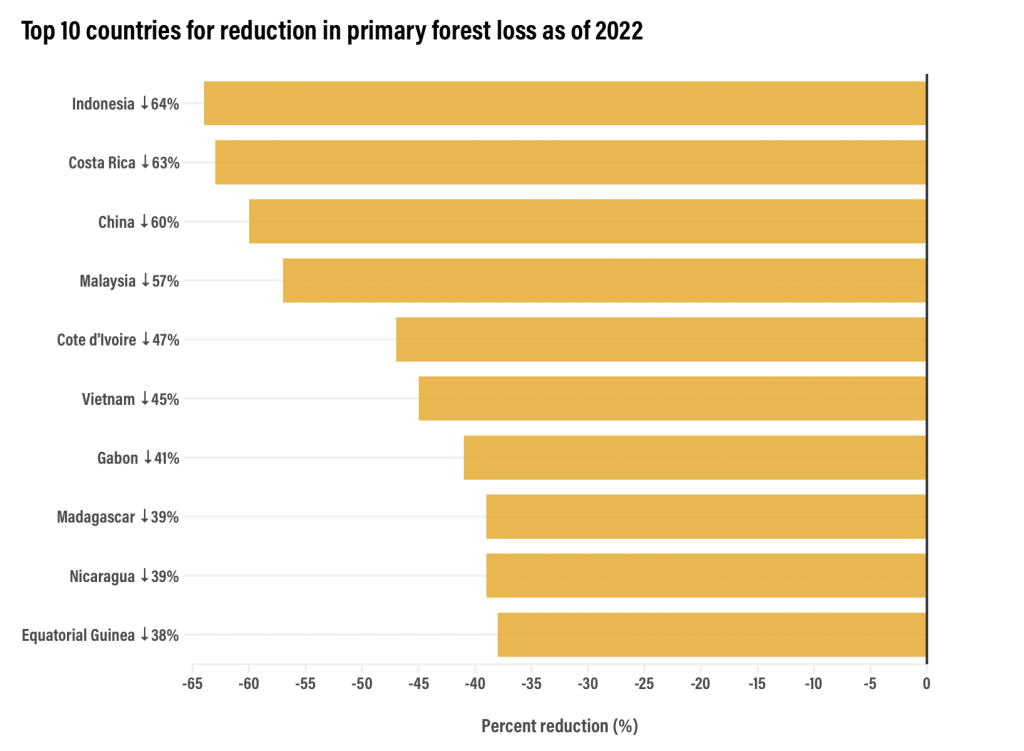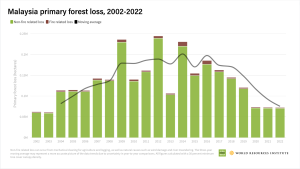Anti-deforestation policy: palm oil as a sustainable modelBY ANTONIO PICASSO
- 29 August 2023
- Posted by: Competere
- Category: SUSTAINABLE NUTRITION

Coinciding with the implementation of the EU Deforestation-Free Regulation (EUDR), the World Resources Institute (WRI) has released the 2022 Outlook on anti-deforestation policies embraced by agricultural commodity-producing nations. This report particularly highlights the achievements of the palm oil industry in curtailing the exploitation of the Earth’s critical green ecosystems.
PERSISTENT CONCERNS
On a broader scale, the WRI criticizes the escalating exploitation of primary rainforests. Concerns remain regarding the commitment of world leaders to enforce counteractive policies that halt deforestation by 2030.
Between 2021 and 2022, there was a stark loss of 4.1 million hectares of forests within the tropical belt. The regions most affected include Brazil and the Democratic Republic of Congo. Specifically, while minor actors in palm oil cultivation, they are ecosystems subject to significant demographic expansion and exposed to intensive exploitation of local natural resources. In both cases, it’s worth noting that deforestation is not linked to intentional fires – usually set to clear virgin land for agricultural purposes – but to industrialized logging, aimed at fueling the timber industry (construction and furniture). This also serves as a strong point to absolve the palm oil industry from ongoing deforestation.
PALM OIL AGAINST THE TREND
- Indonesia and Malaysia
Indonesia and Malaysia have managed to keep deforestation rates at historic lows. As shown in the accompanying WRI graph, the loss of primary forests in Indonesia has decreased by 64%.

Corrective actions, pursued through the goal of achieving negative CO2 emissions by 2030, have led to a significant reduction in forest loss. In Indonesia, this reduction has been possible thanks to the implementation of effective national-level fire prevention measures, as well as renewed commitments to peatland restoration and mangrove rehabilitation.

Similar commitments in Malaysia have contributed to a 57% reduction in forest loss starting from 2022. The consistent rates observed since 2020 can be attributed to various factors, including mandatory MSPO certification, initiated in the same year. Furthermore, Malaysia has set a maximum limit for plantation areas, extending until 2023, and introduced sanctions for illegal deforestation in 2022.
 The adoption of No Deforestation, No Peat, No Exploitation policies (NDPE) by these countries has proven effective, serving as valuable examples for other nations.
The adoption of No Deforestation, No Peat, No Exploitation policies (NDPE) by these countries has proven effective, serving as valuable examples for other nations.
- Guatemala and Colombia
Since 2009, Guatemala has witnessed a significant decline in forest loss, except for the years 2016 and 2020. Particularly between 2021 and 2022, the lowest historic level of forest loss in the last twenty years has been recorded. Colombia, the world’s third-largest palm oil producer, reversed its trajectory after high deforestation rates in the 2018-2021 period. Starting from the past year, Colombia and Guatemala have consistently shown commitment in the fight against deforestation in recent years, as indicated by the statistics for 2021 and 2022.
WORLDWIDE BENCHMARK
The palm oil industry has thus become a global model for sustainable development. Moreover, data confirms that producing countries were capable of achieving significant results even before the implementation of the EUDR. For years, commitments made by both mandatory and voluntary production forces have played a crucial role in driving change. Despite controversies, measures such as the EUDR itself – the WRI recalls that RSPO had already tightened certification requirements since 2016 – should be interpreted as incentives for competitiveness. Under the banner of “the norm fosters customer loyalty,” businesses have recognized that staying in the market requires a change of pace. For the Western customer, i.e., the transformer of the commodity – indispensable in terms of acquired quantity and financial availability – sustainability is business-critical.
It is from here that the certification process originated, allowing palm oil to demonstrate the guarantee of sustainability practices adopted throughout the supply chain. The combined arrangement between the norm and the predisposition of production units towards sustainability allows WRI observers to be optimistic about the full implementation of the EUDR within the next 18 months.
The sector, increasingly certified as sustainable, is taking steps in the right direction to achieve a truly “sustainable compliant” product. It is therefore essential that the media and European institutions recognize this and act based on this reality, encouraging other industries to embark on this path.
WRI’s message is thus a “call to action” for institutions and production forces to follow in the footsteps of palm oil. “While some countries have shown promising results in reducing forest loss, such as Indonesia and Malaysia – as stated in the report’s conclusions – others have continued to engage in activities and policies that are accelerating deforestation in critical areas.” Hence the need to transition to political commitments that strike the right balance between economic interests and the urgency to curb global climate change and protect people and biodiversity.
Image credits: courtesy of TheStar >>>
